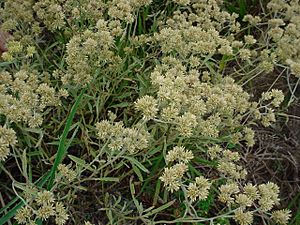Macela facts for kids
Quick facts for kids Macela |
|
|---|---|
 |
|
| Scientific classification |
|
| Kingdom: | Plantae |
| Clade: | Tracheophytes |
| Clade: | Angiosperms |
| Clade: | Eudicots |
| Clade: | Asterids |
| Order: | Asterales |
| Family: | Asteraceae |
| Genus: | Achyrocline |
| Species: |
A. satureioides
|
| Binomial name | |
| Achyrocline satureioides |
|
| Script error: The function "autoWithCaption" does not exist. | |
| Synonyms | |
|
|
Script error: No such module "Check for conflicting parameters".
Achyrocline satureioides, commonly known as marcela, is a type of plant in the Asteraceae family. It grows naturally in South America. You can find it from Argentina all the way to Colombia and Guyana.
Marcela is a herbaceous plant, which means it has soft, green stems instead of woody ones. It usually grows to be about one meter (or three feet) tall. Its leaves are simple and narrow, with slightly jagged edges. Around Easter time, marcela produces pretty yellow flowers that grow in clusters called racemes.
Uses of Marcela
Marcela is a very important plant, especially in South America. It is known for its many uses, particularly as a medicinal plant.
Medicinal Uses
In Brazil, marcela is a special symbol for the state of Rio Grande do Sul because of its healing properties. People in countries with a strong Guarani cultural heritage, like Paraguay, Uruguay, and northern Argentina, also use this plant a lot.
Scientists have found natural compounds in marcela, such as isorhamnetin, luteolin, and quercetin. These compounds are helpful because they can fight certain viruses, like those that cause herpes. This shows how powerful natural plants can be!
Cultural Uses
Marcela is also used in cultural celebrations. In South Portugal, for example, people sometimes burn marcela during popular festivals. They enjoy the pleasant smell that comes from the burning plant. This tradition adds to the plant's cultural importance beyond its medicinal uses.
 | Sharif Bey |
 | Hale Woodruff |
 | Richmond Barthé |
 | Purvis Young |

